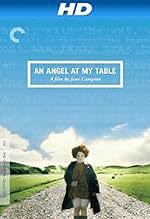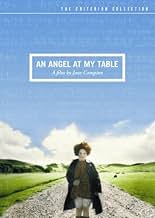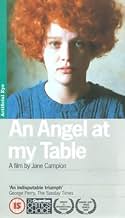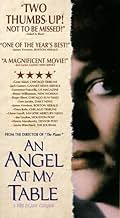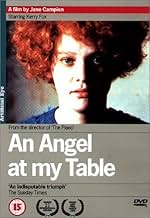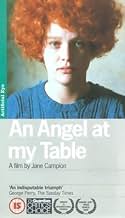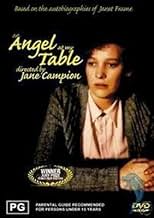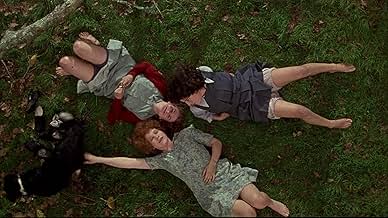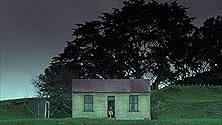IMDb RATING
7.4/10
9.1K
YOUR RATING
Janet Frame was a brilliant child who, as a teen, was misdiagnosed with schizophrenia. Explore Janet's discovery of the world and her life in Europe as her books are published to acclaim.Janet Frame was a brilliant child who, as a teen, was misdiagnosed with schizophrenia. Explore Janet's discovery of the world and her life in Europe as her books are published to acclaim.Janet Frame was a brilliant child who, as a teen, was misdiagnosed with schizophrenia. Explore Janet's discovery of the world and her life in Europe as her books are published to acclaim.
- Awards
- 19 wins & 5 nominations total
Kevin J. Wilson
- Father
- (as K.J. Wilson)
- Director
- Writers
- All cast & crew
- Production, box office & more at IMDbPro
Featured reviews
I discovered this incredible film by accident, if there are such things as accidents like this...I saw the title in a movie review book (and a very brief summary) and it intrigued me. Because I knew it was a New Zealand import from years ago, I never even bothered trying to locate a copy. So when it called out to me months later from the shelves in the video shop, I felt eerily compelled to rent it. I watched it by myself in the wee hours of the morning--and it could not have been more ideal.
An Angel at My Table is the story of New Zealand's famous writer, Janet Frame. Fairly long, but never boring, it is told in three 50 minute interludes, taking us through her impoverished childhood, awkward adolescence, and the terrifying and eventually triumphant years that follow: Janet was a plump little girl, with an unruly mop of bright red hair. She was fascinated with books and stories at an early age ~ a friend had lent her a copy of Grimm's which she treasured. A certificate of merit in grade school allowed her the use of the public library where she became even more immersed in literature. Despite financial hardships, her father managed to buy her a journal "for her writings." By her late teens she was no longer plump, but a rather crippling shyness had set in. At social functions she played the wallflower. She preferred to be by herself, where she could nurture her passion for creating stories. She went on to become a teacher (though the idea no longer appealed to her), and suffered a panic attack when a supervisor "sat in" on one of her classes. It was advised that Janet have a psychiatric evaluation--a misdiagnosis of schizophrenia (later changed to nothing more than shyness and depression) landed her in a mental institution for eight years of electric shock therapy, each session she narrated to be: "equal in fear to that of an execution." She was scheduled for a partial lobotomy when news reached her doctors that she had won a national literary award--during her hospitalization her sister had published a book of Janet's short stories. She was almost immediately released under the premise that a talented author couldn't possibly need the treatment she had been receiving....At this point Janet was in her late twenties, but her lengthy "exile" had given the impression that she was considerably younger than that. A friend of the family's, another writer who admired her work, offered her a cottage on his property so that she could write seriously in a distraction-free environment. She accepted the offer and her first completed work there was accepted soon after. European travels were arranged for her, more successful books were born, and fame attained...
I've heard it claimed that Janet had also attained happiness, but I am not sure that I agree. Janet had found numerous freedoms, emotional and financial and of course physical, but happiness? I believe that she had become comfortable with herself, and perhaps that in itself is a happiness. She never did fit into the surrounding world--but lived peacefully alone on the vaporous outskirts. A very supportive therapist in London had told her, "If people tell you that you should go out there and mix, and you don't feel like it,...don't." She took his words to heart.
I was surprised with the overall beauty of this film~I guess I should not have been~the director was Jane Campion (The Piano, Portrait of a Lady). The New Zealand landscapes and backstreets of Spain were gorgeously rendered, the accompanying score at times both capricious and melancholy. But above all, what struck me most, was how I identified with Janet. The plump and impoverished childhood, the obsession with writing, the painful shyness and reclusiveness. The life of the outsider~luckily minus the stay in the psychiatric ward. On some level I was Janet (or am Janet). And there is something oddly redemptive in finding a twin on screen or in a book, however juvenile the notion...
An Angel at My Table is the story of New Zealand's famous writer, Janet Frame. Fairly long, but never boring, it is told in three 50 minute interludes, taking us through her impoverished childhood, awkward adolescence, and the terrifying and eventually triumphant years that follow: Janet was a plump little girl, with an unruly mop of bright red hair. She was fascinated with books and stories at an early age ~ a friend had lent her a copy of Grimm's which she treasured. A certificate of merit in grade school allowed her the use of the public library where she became even more immersed in literature. Despite financial hardships, her father managed to buy her a journal "for her writings." By her late teens she was no longer plump, but a rather crippling shyness had set in. At social functions she played the wallflower. She preferred to be by herself, where she could nurture her passion for creating stories. She went on to become a teacher (though the idea no longer appealed to her), and suffered a panic attack when a supervisor "sat in" on one of her classes. It was advised that Janet have a psychiatric evaluation--a misdiagnosis of schizophrenia (later changed to nothing more than shyness and depression) landed her in a mental institution for eight years of electric shock therapy, each session she narrated to be: "equal in fear to that of an execution." She was scheduled for a partial lobotomy when news reached her doctors that she had won a national literary award--during her hospitalization her sister had published a book of Janet's short stories. She was almost immediately released under the premise that a talented author couldn't possibly need the treatment she had been receiving....At this point Janet was in her late twenties, but her lengthy "exile" had given the impression that she was considerably younger than that. A friend of the family's, another writer who admired her work, offered her a cottage on his property so that she could write seriously in a distraction-free environment. She accepted the offer and her first completed work there was accepted soon after. European travels were arranged for her, more successful books were born, and fame attained...
I've heard it claimed that Janet had also attained happiness, but I am not sure that I agree. Janet had found numerous freedoms, emotional and financial and of course physical, but happiness? I believe that she had become comfortable with herself, and perhaps that in itself is a happiness. She never did fit into the surrounding world--but lived peacefully alone on the vaporous outskirts. A very supportive therapist in London had told her, "If people tell you that you should go out there and mix, and you don't feel like it,...don't." She took his words to heart.
I was surprised with the overall beauty of this film~I guess I should not have been~the director was Jane Campion (The Piano, Portrait of a Lady). The New Zealand landscapes and backstreets of Spain were gorgeously rendered, the accompanying score at times both capricious and melancholy. But above all, what struck me most, was how I identified with Janet. The plump and impoverished childhood, the obsession with writing, the painful shyness and reclusiveness. The life of the outsider~luckily minus the stay in the psychiatric ward. On some level I was Janet (or am Janet). And there is something oddly redemptive in finding a twin on screen or in a book, however juvenile the notion...
I think this film is another fine example of Kiwi talent! Some incredibly original literature, film, television, and acting talent originates from the island nation of New Zealand. "An Angel At My Table" is one of the great examples. The first time I saw this film (or tele-film) I was left emotionally affected by Janet Frame's life. I could not believe how easy it was for someone to be treated the way she was just because she was shy, socially awkward and had curly, red hair. How times have changed! Nowadays if you are not a freak ... you are a freak! It is scary to think how easy it was, apparently at that time, for a person to be thrown into a madhouse. Not to mention the deplorable conditions of those types of institutions.
Initially, I felt sorry for Ms. Frame but then I realized she probably has had a fuller life than I have had (or probably ever will). She has accomplished so much and given pleasure to the many who have read her stories and poetry. Watching this film has prompted me to begin looking for her writings since I have been so intrigued by her story. I was glad to see that by the end of the movie she had begun to become comfortable with herself and open her shell. Biographical information on Ms. Frame seems sketchy. I have not found much information about her life after the period where the film ended.
Thank you Jane Campion for another wonderful character driven film (albeit a real-life character this time)! The only real criticism I have of the film is the portrayal of Frame's time in the institution. While the film did not make it pretty nor gloss over the situation in general, sources I have read indicate Janet was dangerously close to receiving an operation that seems similar to a lobotomy. The operation, if performed, would have left Janet an emotionless, child-like creature and was not adequately depicted. But for the grace of her publication, she was saved.
Initially, I felt sorry for Ms. Frame but then I realized she probably has had a fuller life than I have had (or probably ever will). She has accomplished so much and given pleasure to the many who have read her stories and poetry. Watching this film has prompted me to begin looking for her writings since I have been so intrigued by her story. I was glad to see that by the end of the movie she had begun to become comfortable with herself and open her shell. Biographical information on Ms. Frame seems sketchy. I have not found much information about her life after the period where the film ended.
Thank you Jane Campion for another wonderful character driven film (albeit a real-life character this time)! The only real criticism I have of the film is the portrayal of Frame's time in the institution. While the film did not make it pretty nor gloss over the situation in general, sources I have read indicate Janet was dangerously close to receiving an operation that seems similar to a lobotomy. The operation, if performed, would have left Janet an emotionless, child-like creature and was not adequately depicted. But for the grace of her publication, she was saved.
In the ambitious follow-up to her celebrated debut feature 'Sweetie' Jane Campion presents yet another social misfit at odds with an unsympathetic world, drawing her inspiration this time from the autobiography of Janet Frame, a New Zealand writer who suffered eight years of electro-shock therapy after being misdiagnosed for schizophrenia. The film is structured in the form of a triptych, with the best moments (perhaps not surprisingly) all clustered in the first episode, showing the young Frame's childhood in a poor but literate household, always at the mercy of adult authority: teachers, doctors, and so forth. These early scenes aren't exactly meant to set a cheerful mood, but they look positively giddy compared to the rest of the film, the length of which eventually overwhelms its subject: watching the drab and lonely life of a painfully shy, pathetically insecure, repressed and introverted writer unfold over 158 minutes can be an oppressive experience. Campion's unique visual style is never less than interesting, but her technique of using sudden blackouts to separate short, seemingly unrelated fragments of narrative memory only underscores the difficulty of capturing on film the creative process of a writer.
It's a biography of New Zealand author Janet Frame played by three different actresses over her life. She was born in 1924. Her large family is relatively poor. She's a chubby sensitive kid with big wild red hair. As a young teacher (Kerry Fox), she has an emotional breakdown and spends time in a mental hospital. She is diagnosed a schizophrenic. With her mother's approval, she is admitted to a mental hospital for over 8 years where she is subjected to 200 shock treatments barely escaping brain surgery.
This is an interesting portrait of a life. It isn't that dramatic except for the hospital section. It's more a series of events where a nervous Janet is belittled and overlooked. It doesn't fit the traditional three act play structure. It's a simple straight time line of events. Jane Campion uses her style of directing. It's natural and confident. A more standard biopic would concentrate on the 8 year hospital stay making a drama out of it. Instead, this way is a more humanistic way of showing a life. Kerry Fox is terrific and the little girl has an unforgettable look.
This is an interesting portrait of a life. It isn't that dramatic except for the hospital section. It's more a series of events where a nervous Janet is belittled and overlooked. It doesn't fit the traditional three act play structure. It's a simple straight time line of events. Jane Campion uses her style of directing. It's natural and confident. A more standard biopic would concentrate on the 8 year hospital stay making a drama out of it. Instead, this way is a more humanistic way of showing a life. Kerry Fox is terrific and the little girl has an unforgettable look.
Superficially, this is a sort of "My Brilliant Career," meets "A Beautiful Mind."
It features one of the most extraordinary actresses, new to me. I saw her in "Intmacy" and had to find more. It is made by a talented and sometimes engaging filmmaker who explores how women are haunted. It is about a writer whose books don't grab me, but whose story does. She believed herself haunted.
The problem is that these three songs from different souls don't overlap that much.
Frame created written images that were teased out of a struggle with life, one that infused her. Her sanity came from the writing. She didn't write about insanity and marginalization, she wrote from them to counter and co-opt them somewhat. This engages the reader because most of us are afraid to go as deeply into the darkness as these visions indicate.
That's a different thing entirely than the story Campion has chosen to give us, which is about all the external agency that surrounded her. I cannot think of an instance where the literary kite and the cinematic string are in such different dimensions. Sure, its an interesting story that someone's light survived, I suppose. But we never see that light, or the ledges that were climbed, or the images that were carried out for us.
What's left for Fox to do is emote visually. She does an extraordinary job, quite apart from the fact that it is ineffective in this container. I really do think she's something another of those Australian/New Zealand crowd that just seem to have something that is rare elsewhere.
She and the girls who play her younger selves are redheads. That's not at all a cinematic device, though it is used cleverly to mend the three actresses. Frame actually had that Clarabelle hair.
Ted's Evaluation -- 2 of 3: Has some interesting elements.
It features one of the most extraordinary actresses, new to me. I saw her in "Intmacy" and had to find more. It is made by a talented and sometimes engaging filmmaker who explores how women are haunted. It is about a writer whose books don't grab me, but whose story does. She believed herself haunted.
The problem is that these three songs from different souls don't overlap that much.
Frame created written images that were teased out of a struggle with life, one that infused her. Her sanity came from the writing. She didn't write about insanity and marginalization, she wrote from them to counter and co-opt them somewhat. This engages the reader because most of us are afraid to go as deeply into the darkness as these visions indicate.
That's a different thing entirely than the story Campion has chosen to give us, which is about all the external agency that surrounded her. I cannot think of an instance where the literary kite and the cinematic string are in such different dimensions. Sure, its an interesting story that someone's light survived, I suppose. But we never see that light, or the ledges that were climbed, or the images that were carried out for us.
What's left for Fox to do is emote visually. She does an extraordinary job, quite apart from the fact that it is ineffective in this container. I really do think she's something another of those Australian/New Zealand crowd that just seem to have something that is rare elsewhere.
She and the girls who play her younger selves are redheads. That's not at all a cinematic device, though it is used cleverly to mend the three actresses. Frame actually had that Clarabelle hair.
Ted's Evaluation -- 2 of 3: Has some interesting elements.
Did you know
- GoofsThe streets of Ibiza have some features that surely were not present on the 50s, i.e., a "no parking" signal on one of the streets. Cars were very rare on the island those days.
- SoundtracksSomebody Stole My Gal
Written by Leo Wood
Performed by Pat McMinn with Crombie Murdoch and the Nickelodeons
Used by permission of D.F. Peach
- How long is An Angel at My Table?Powered by Alexa
Details
- Release date
- Countries of origin
- Languages
- Also known as
- Un ángel en mi mesa
- Filming locations
- Production companies
- See more company credits at IMDbPro
Box office
- Gross US & Canada
- $1,054,638
- Opening weekend US & Canada
- $12,905
- May 27, 1991
- Gross worldwide
- $1,055,995
- Runtime2 hours 38 minutes
- Color
- Aspect ratio
- 1.66 : 1
Contribute to this page
Suggest an edit or add missing content



